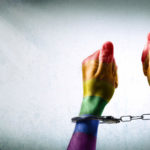In a perfect world, the church would never need to address sinful behavior but could focus its full attention on how to better serve God and strengthen a personal relationship with Him, but we do not live in a perfect world. Instead, we live in a fallen world where sinful behavior continually threatens the ability of God’s people to serve Him and to strengthen their relationship with Him. Therefore, sin must be addressed, and Jesus provided an example of how this ought to be accomplished. He did not spend His teaching ministry avoiding particular sins and social debates. Rather, He specifically identified and spoke into such sins as self-righteousness, hypocrisy, hatred, lying, adultery, divorce, etc. Many of these were incredibly controversial topics in Jesus’ time, and his words caused widespread offense.
Likewise, we as the church ought not to be afraid of addressing specific sins and possibly even causing offense by speaking the truth in love, as is taught in Ephesians 4:11–16. In fact, the Apostle Paul referred to the gospel as “the offense of the cross” in Galatians 5:11, and he warned the church in Corinth that this gospel message—which is the very foundation of the church—is offensive when properly presented. Second Corinthians 2:14–16 says, “Thanks be to God, who in Christ always leads us in triumphal procession, and through us spreads the fragrance of the knowledge of him everywhere. For we are the aroma of Christ to God among those who are being saved and among those who are perishing, to one a fragrance from death to death, to the other a fragrance from life to life.”
The truth that every person is separated from God by his sinful behavior and is destined to a second death in hell must cause offense. This offense leads some to embrace the truth that they can never have a right relationship with God on their own apart from the forgiveness that Jesus Christ offers through His death, burial, and resurrection. For these the offense of this gospel becomes the fragrance of life, but others are repulsed by this dependency upon Jesus Christ for forgiveness. For them this offense is the pungent smell of death. They reject the gospel and seek to either separate themselves from the speaker or to silence him.
Certainly, we have witnessed this truth time and again, but the homosexual issue is perhaps one of the more extreme examples of this in today’s culture. There is a concerted effort to silence any who would express disapproval of homosexuality, and this is being accomplished in two ways. The first is through intimidation, and the second is through judicial force.
Today it seems that no person can express disapproval of homosexuality without being personally assaulted. At the very least he will be accused of hate speech, regardless of the spirit in which it is said, regardless of any qualifications which may be included, and regardless of the context. In contrast to this those who support homosexuality can verbally assault these individuals with seeming immunity regardless of how abusive and slanderous their language may be. As an illustration, consider the testimony of Dr. Michael Brown who was interviewed by Thom Hartmann on his nationally syndicated radio program. Dr. Brown is an individual full of compassion and love who regularly talks into the issue of homosexuality but who never does so with a mean or proud spirit.
During this interview, Thom Hartmann asked Dr. Brown for his views on homosexuality. The question having been asked, Dr. Brown grouped it together with other forbidden practices in Scripture, including adultery, drunkenness, and religious hypocrisy. He did not elevate homosexuality above these other sins, and he told Thom that he had encouraged a woman only the day before to treat with unconditional love her 21-year-old son who had just come out of the closet. Despite the context and the spirit with which this was said, a listener to the program wrote to Dr. Brown’s website:
Having just heard you on Thom Hartmann, (5/12/09), all you’ve done is convey to the public at large that you are an ignoramous [sic], who no more warrants the moniker of “Doctor” than an earthworm. … What is it you don’t get, you stupid [expletive]!? Your “Holy Holy Holy” hypocricy [sic] doesn’t fool me. You’re either a very sick individual, or evil to the core. Which is it? … People like you are bigots, hate mongers, dare I say racist, and more lunatic than lunatic. You are clearly a dangerous, mean-spiritted [sic] madman—and a CHARLATAN, SNAKE-OIL SALESMAN, and a hypocrite of the first order. If there is a hell—which, of course there isn’t,—I hope there’s a special place for wicked, nasty people like you.[1]
Unfortunately, this is not an exceptional response. Those who speak against homosexuality are rarely given the benefit of the doubt, are rarely quoted in context, and are rarely treated with civility. It is common for such to be accused of being hateful, racists, homophobic, and Nazis. Moreover, because any disapproval of homosexual practice is considered to be hateful and mean-spirited, there is an effort to use judicial force to categorize such dissent as a hate-crime.
Already this has been accomplished in Canada where the Supreme Court of Canada has ruled that quoting the Bible regarding the sin of homosexual behavior is considered to be hate-speech.[2] Similarly, in the United Kingdom, the Association of Chief Police Officers define a homophobic incident as “any incident which is perceived to be homophobic by the victim or any other person.”[3] In other words apart from reality, if the victim or any onlooker imagines that something homophobic was said, then a hate-crime was committed.
In analyzing this it should not be surprising that Christians are persecuted, slandered, and falsely accused for holding to their religious convictions and for speaking the truth in love because this is precisely how our Savior was treated. In fact, Jesus warned His disciples in John 15:18–21 that this would be the Christian’s reality:
“If the world hates you, know that it has hated me before it hated you. If you were of the world, the world would love you as its own; but because you are not of the world, but I chose you out of the world, therefore the world hates you. Remember the word that I said to you: ‘A servant is not greater than his master.’ If they persecuted me, they will also persecute you. If they kept my word, they will also keep yours. But all these things they will do to you on account of my name, because they do not know him who sent me.”
Fear of persecution is no excuse for avoiding the issue of homosexuality. Fear of offending someone with the truth when spoken in love is no excuse for avoiding the issue of homosexuality. Fear of being accused of inflating and unfairly “picking on” the sin of homosexuality is no excuse for avoiding the issue. Rather, this is a sin that is causing severe physical, mental, and emotional harm to many individuals in addition to being the catalyst for attacking fundamental social and moral issues. As such, we are compelled to speak into this issue. However, as we do, let us continually keep in mind that were it not for the grace of God, any one of us could find ourselves suffering from the same sin. Were it not for the grace of God, every one of us would experience the same second death in hell as the homosexual as a punishment for our sins.
By no means are we superior to people with same-sex attractions, nor are we more righteous apart from Jesus Christ. Rather, because we have been shown mercy and forgiven of so much sin, we ought to be filled with love and compassion for others who find themselves ensnared by sin. But this is a love that directs sinners to a Savior who can free them from their bondage to sin. This is why the Apostle Paul wrote to the Corinthian church in 1 Corinthians 6:9–11:
Or do you not know that the unrighteous will not inherit the kingdom of God? Do not be deceived: neither the sexually immoral, nor idolaters, nor adulterers, nor men who practice homosexuality, nor thieves, nor the greedy, nor drunkards, nor revilers, nor swindlers will inherit the kingdom of God. And such were some of you. But you were washed, you were sanctified, you were justified in the name of the Lord Jesus Christ and by the Spirit of our God.
Homosexuality is not the unpardonable sin. What the homosexual needs is not to become a heterosexual but to become a Christian whose identity is found in the righteousness of Jesus Christ, and who has experienced a transformation within his spirit. As for those of us who have already experienced this transformation, we need to be talking about this issue and taking this gospel—this good news—to those who are enslaved by the sin of homosexuality. To accomplish this, the Christian must be both capable and willing to speak into the issue of homosexuality.
Be sure to read Timothy Zebell’s book Laid Bare: Uncovering the Relationship Between Homosexuality & the Gospel.
Free Downloads
Share...
1. Brown, Michael. A Queer Thing Happened to America, 63–64. Concord: EqualTime Books, 2011.
2. Mephibosheth, Gabriel. “Supremes Rule Bible as ‘Hate Speech’ in Canada.” Culture News, March 18, 2013. Accessed June 12, 2014. http://culturecampaign.blogspot.com/2013/03/supremes-rule-bible-as-hate-speech-in.html.
3. Brown, A Queer Thing, 534.
Unless otherwise noted, all Scripture quotations are taken from The Holy Bible, English Standard Version, copyright ©2001 by Crossway Bibles, a publishing ministry of Good News Publishers. Used by permission. All rights reserved.









